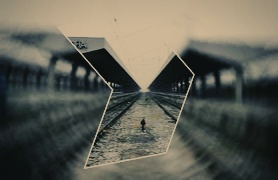Three short steps and the poet is on the train. He turns back and smiles. The three steps remind him of a haiku and he mutters:
Three steps and I’m gone
Conversations change forever
Seasons come and go.
He slowly swivels on his heels to face the compartment and watches the fans pretending to dry the sweat off perspiring commuters. The seats seem to smile a welcome. Each section is ready to thank him if he chooses to sit on a seat there.
’72 seats’, he tells himself, ‘8 people can sit in each section and there are 9 of them her. Almost like three stanzas of three lines and each having 8 syllables.’ He stands there thinking and then squats on the floor, swishes out a small black notebook, and writes:
People move in and out daily
Talking, chatting, smiling gaily
Until they’ve all moved out of here
No, not because of any fear
But just because their home is dear
For that’s the path that’s full of fun.
The train must move for one or none
The train from here to there must run
Its job is never really done.
The poet reads the lines he has written, sighs, and thinks, ‘This compartment is now empty but was full of people in the previous trip. It must have heard some really powerful conversations.’
‘Or words that mean nothing,’ said a voice.
The poet walks through the compartment slowly to the other end and seeing no one, concludes he must have imagined that voice. ‘Poets imagine everything,’ he thinks, ‘and I guess this is a pretty good game. Ask a question and answer it in a different voice.’ He laughs.
The poet hears a laughter. This was clearly not his voice. Nor his imagination. The post walks back to the place where he had boarded the train. He looks inside the toilets. He walks up and down the aisle, looks under the berths, and though he finds it ridiculous, he even opens the door and looks out of the running train. It is dark and all he sees are blurry silhouettes and all he feels is a sharp blast of cold air. He quickly closes the door and carefully speaks in a loud and clear voice, ‘Does an empty compartment in a running train speak?’
‘Every moment has a voice,’ a voice boomed. This time it seemed to come from one of the fans that was busy whirring. So he persists in his query, ‘And why would it want to do this?’
‘Because having a voice is the only thing that matters,’ the voice booms back.
The poet waves his hands and says, ‘So a voiceless moment is actually an empty compartment. And an empty compartment with a voice is what really lives. Right?’
There was a lot of screeching and the train was obviously slowing down as the next station was almost there. The poet walked to the door and waited for the train to stop.
His wife was at the station to receive him, and as he jumped down, she said, ‘Where are your dolls?’
‘Dolls?’ he said, ‘Ah! The dolls. I must have forgotten them at the theatre. Don’t worry. They’re safe… and I was able to practice my ventriloquism on the fans in the train.’
.
.
.
.
‘This post is a part of Write Over the Weekend, an initiative for Indian Bloggers by BlogAdda.’
.
.
Arvind Passey
26 September 2016









